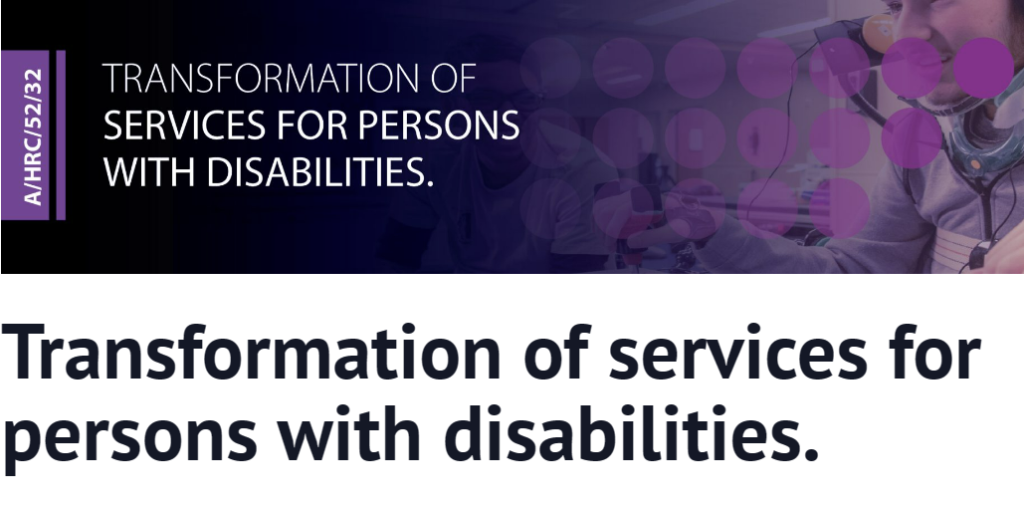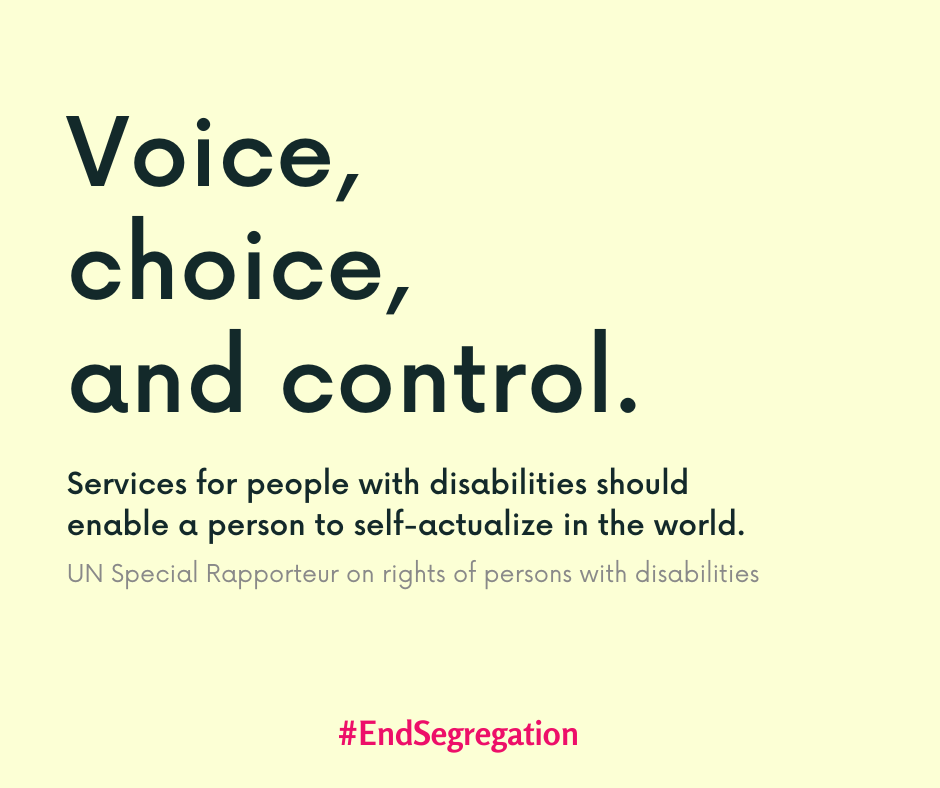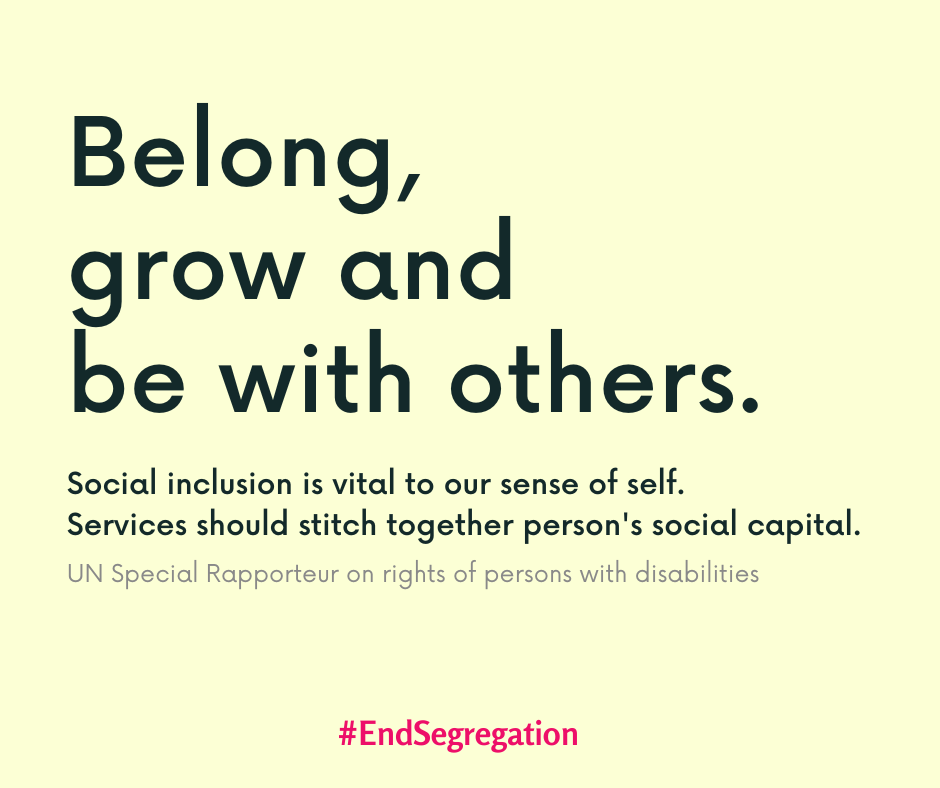Gerard Quinn, the UN Special Rapporteur on the rights of persons with disabilities, published a report on transformation of services for people with disabilities. Milan Šveřepa tries to summarise:
The report calls for support services to implement these changes:
- Services based on personhood, focused on supporting personal development and inclusion in the community.
- Policy and law aimed at dismantling institutionalisation and segregation, to departure from the medical model of disability.
- Integrate businesses and the private sector along with civil society and the state as partners in social services and support.

Transformation of services for persons with disabilities. Source: srdisability.org
Support services must change
“It is hard to talk about the formal right to live independently and be connected to the community without talking about the kinds of services needed to make it a reality,” the report says in describing why support services must change.
“No amount of positive law reform will be sustainable unless the underlying ecosystem of support and services changes.
“Disability service system owes much to the medical model of disability. It is commonly said to focus on deviations from a norm (how “normal” humans function) and then on the design of interventions to “fix” the deviation in the person. This contributed to a narrow social support philosophy mainly seeking to “compensate” the person with a disability for their “loss”. The focus was on the impairment, not the person.”
The CRPD changes this, and support services must follow: “Taking common humanity rather than impairment as the core departure point means taking the person seriously as an end in themselves and as a free moral agent.”
“It should be about autonomy – voice, choice and control – and social inclusion. Services of the future should primarily be about enabling one to self-actualize in the world.”

Voice, choice, and control. Services for people with disabilities should enable a person to self-actualize in the world. UN Special Rapporteur Disability
Living independently and being included in the community
The right to live independently and be included in the community “is directed at enabling the free development of one’s personality, in a home of one’s own, and with free interaction in the community: a mix of moral agency with social inclusion.
“Home is an intensely private place for repose and the evolution of identity, and it is spatially connected with the community, allowing one to engage on one’s own terms.
“The implications for the future of services are clear. For persons with disabilities to lead in all matters concerning their own lives, a reorientation will be required away from fixation on impairments and towards the life choices of the person.
“Since social inclusion is vital to the evolution of our sense of self, services should stitch together social capital to ensure an equal right to belong, to grow and to be connected with others.”
Families had been taken for granted
Inclusion Europe, alongside Inclusion International, contributed to the consultation leading to this report. We are please to see some of the points we made reflected in the report.
- 36. Inclusion Europe noted that persons with disabilities should not be reduced to their physical needs, as if impairment was the only thing that defined them. With respect to language, it asserted that terms such as “service users”, “clients” or “care receivers” served to reinforce that stereotype. It asserted that services and support should not focus on security and protection in a narrow sense. It emphasized that services tended to be delivered in groups, in a one-size-fits-all-fashion.
- 44. Many States highlighted the pivotal role that families played in providing informal support. Inclusion Europe emphasized that formal services ought not to be the ultimate objective and stressed that as much as 80% of all long-term support was provided by informal carers. It underscored that support policies and provision must take that fact into account and ensure that families did not bear the brunt of caregiving, including becoming “care managers, care administrators and service coordinators”.
“Families had been taken for granted by States to make up for gaps in services,” the report notes. “In designing any new system, assumptions about the family taking on essential tasks must be set aside. There must be a much more intentional focus on the relationship between informal, family-led support and other, formal support.”
“For some persons with disabilities, family could be a source of conflict, trauma and loss of agency. Overreliance on families may therefore hamper recovery, and a delicate balance is required. Simply relying on families to absorb all and every support need is not adequate for the future. Family support must be based on the active consent of the service user.”
Tools to reshape services
“Formal rights are not enough. Effective policies are needed to ensure that the human rights framework penetrates and changes the service delivery model.
- Promising example is the recently adopted law in Israel on social services for persons with disabilities, which should enter into force in 2024.
- An outstanding example of blue-sky thinking on new models is the New Zealand Law Foundation’s paper Removing Disabling Experiences: A Vision for the Future of Our People.
- Reform of the service sector is directly connected to the full restoration of power to persons with disabilities over their own lives. Legal incapacity laws substantially erode the power of an individual to control and direct their own lives.”
“Many States reported that they had established broad advisory groups that included persons with disabilities and family members. These forums need to be specifically tasked with ensuring the co-production of service redesign.
- The US National Center on Advancing Person-Centered Practices and Systems has identified several strategies (.pdf) on how to successfully engage persons with disabilities in the co-design of services.”
“The devolution of budgets to individuals with disabilities who can use them to hire the staff and purchase the goods and services that they need (as opposed to what others assume that they need) is a promising approach.
- It requires the handover of control of a notional budget from a service provider to the individual.
- A major challenge is how wide or narrow the spending discretion is (for example, whether it is confined to certain categories of expenditure) and the burden of management and accounting.”
“The availability and accessibility of housing was consistently noted by States as a challenge to providing support for people in the community. This challenge points to the need for much closer alignment between services policy and housing policy, which remains a major gap right around the world.”
Transition away from services based on impairment
The Special Rapporteur concludes:
- States must transition away from service models based exclusively on impairment.
- States must redefine the “public interest” and determine how to invest in and shape the provision of services. Support must shift from medically dominated systems that rely on coercion to support that is freely chosen. Active consultation with persons with disabilities is therefore required, to determine what persons with disabilities need and want. The business sector must embrace its human rights responsibilities and become a partner for change.
- Change requires a new lexicon that rejects labels such as “client”, “consumer” and “service user” and focuses on the core rights of citizenship. Policy tools to manage change include supported decision-making models to create individualized support, peer support networks, independent living centres, standards for public procurement… The provision of support for families, collection of data on system performance, incentivization of new support providers, adoption of standards for service providers and enhancement of oversight and monitoring are likewise needed.
- Donor countries and development assistance agencies must review their programming to ensure that funds are not prolonging legacy services. Instead, donors should be supporting initiatives that prioritize inclusion rather than separation and stigmatization.

Belong, grow and be with others. Social inclusion is vital to our sense of self. Services should stitch together person’s social capital. UN Special Rapporteur Disability
Recommendations
Recommendations to countries:
- Map current services and funding models, and redesign procurement policies to incentivize compliance with the rights of persons with disabilities among service providers.
- Foster entrepreneurship and participation of persons with disabilities among service providers, and ensure accountability for the quality and legal compliance of services.
- Explore the right balance between formal support and informal care, ensuring that personal choice is always respected, and making support available for families and caregiver in informal settings.
- Introduce devolved budgets, with appropriate support, to transfer financial agency and spending control to persons with disabilities.
- Develop protocols on supported decision-making in the specific context of support services.
- Explore what role AI and new technologies can play in the personalization of services, while ensuring that technology does not become a substitute for the human touch.
- Invest in a sustainable workforce that is inclusive of persons with disabilities, supporting training, decent wages and career development.
Recommendations to businesses in the non-profit and private sectors:
- Assess compliance of business models with human rights and ensure that their practices are aligned with the UN Convention on the rights of persons with disabilities.
- Promote the participation of persons with disabilities in the development of business models and administration, ensuring spaces for them in governing boards.
- Ensure that feedback and complaint mechanisms are available to service users.
Recommendations to organizations of persons with disabilities:
- Train and assist persons with disabilities to participate effectively in the co-production of public policy.
- Contribute to the development of user-led service providers.
- Engage with the business sector, to promote changes guided by the principles on business and human rights.
- Demand an active role in licensing and accreditation procedures of both Government and networks of enterprises, and monitor their outcomes closely.
Recommendations to the United Nations and its agencies:
- Ensure that United Nations specialized agencies with a focus on service development, such as the United Nations Development Programme and WHO, meet the goals of disability inclusion.
Recommendations to people and organisations giving money (donors):
- Invest in the capacity of persons with disabilities to advocate Convention-compliant service paradigms and to become implementors of services, including centres for independent living, and encourage entrepreneurship in the community.
- Monitor the human rights impact of their investments.
The report in full is here, available in several languages.
Read also:





